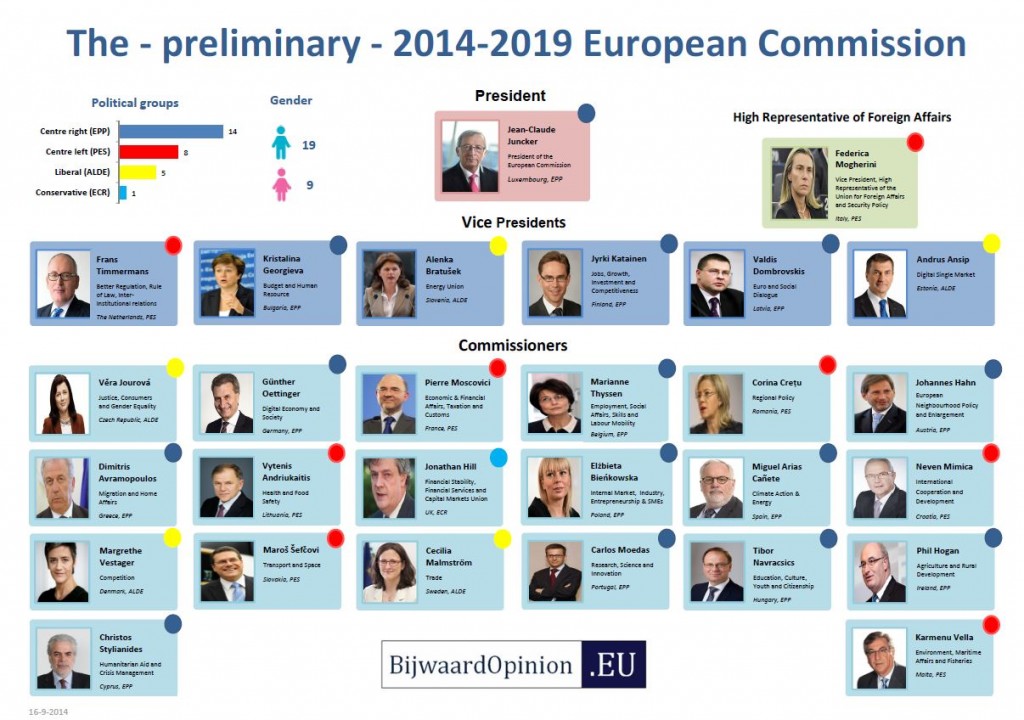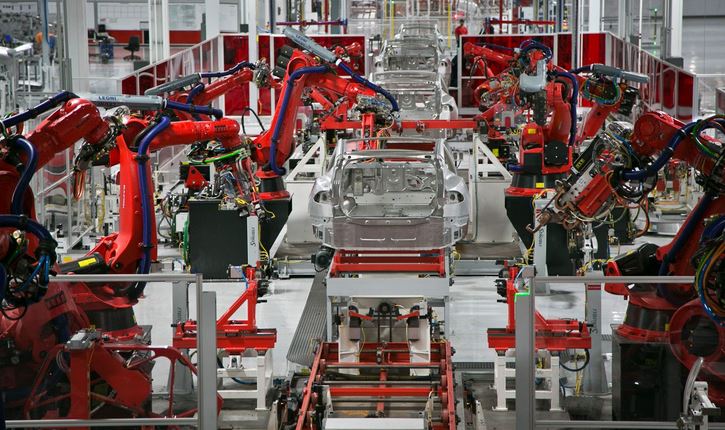At the end of September the hearings by the European Parliament of the Commissioners-designates for the 2014-2019 European Commission will get under way. After having been ‘grilled’, by the European Parliament, the new ‘Juncker Commission’ is expected to take office on 1 November. Worth reading are this EurActiv article on who will hold real power among the 28 new Commissioners, and this EUobserver article on the new power structure of the Juncker Commission. Click on the picture above for my own overview of the Commissioners-designates.
Category Archives: The Press
‘The second machine age’: will automation lead to increasing inequality?
In this thought-provoking article, published in the July/August Foreign Affairs, it is argued that the scarcest, and hence the most valuable, resource in the coming digital era will be neither ordinary labour nor ordinary (physical) capital, but people who can create new ideas and innovations. In this ‘automated economy’, a relatively small number of highly qualified economic ‘top performers’ may reap a disproportionate share of the rewards.:
“The distribution of income for this creative class typically takes the form of a power law, with a small number of winners capturing most of the rewards and a long tail consisting of the rest of the participants. So in the future, ideas will be the real scarce inputs in the world — scarcer than both labor and capital — and the few who provide good ideas will reap huge rewards. Assuring an acceptable standard of living for the rest and building inclusive economies and societies will become increasingly important challenges in the years to come.” Link to the article
The new ‘German question’?
Can Germany lead the European Union out of the economic crisis? The British historian Timothy Garton Ash writes in this interesting article that this is the ‘German question’of our time:
“There is a new German question. It is this: Can Europe’s most powerful country lead the way in building both a sustainable, internationally competitive eurozone and a strong, internationally credible European Union? Germany’s difficulties in responding convincingly to this challenge are partly the result of earlier German questions and the solutions found to them. Yesterday’s answers have sown the seeds of today’s question…” Link to the acrticle
Wetenschappelijke onderbouwing ‘Austerity’ onder vuur
Volgens de Amerikaanse econoom en Nobelprijswinnaar Paul Krugman is hier alle reden toe. ‘Austerity’ zou zijn gebaseerd op een rekenfout:
“In normal times, an arithmetic mistake in an economics paper would be a complete nonevent as far as the wider world was concerned. But in April 2013, the discovery of such a mistake—actually, a coding error in a spreadsheet, coupled with several other flaws in the analysis—not only became the talk of the economics profession, but made headlines. Looking back, we might even conclude that it changed the course of policy…” Lees verder
Schaliegas: Het Westen te vroeg afgeschreven?
Volgens dit artikel op Project Syndicate wel, en dit dankzij de ‘schaliegasrevolutie’. Hoogleraar Internationale Betrekkingen Anne-Marie Slaughter voorziet in dit artikel zelfs een komende ‘Atlantische Eeuw’, dankzij deze opmerkelijke wending op energiegebied.:
“The United States is rising; Europe is stabilizing; and both are moving closer together. That was the principal message earlier this month at the annual Munich Security Conference (MSC),… The participants come primarily from Europe and the US; indeed, when the conference began in 1963, it was focused entirely on NATO members. This year, however, senior government officials from Brazil, China, India, Nigeria, Singapore, Qatar, and Saudi Arabia also joined, an important sign of the times…” Lees verder
Voor Blair EU ‘brutal Realpolitik’
De voormalige Britse premier Tony Blair waarschuwt tegen een ‘Brexit’. De voorstanders van een Brits uittreden uit de EU zouden volgens hem slechts kijken naar de korte termijn. Blair ontkent de ‘design flaws’ in de EU niet, maar stelt dat op de langere termijn een sterke EU enorme voordelen voor het Verenigd Koninkrijk zou opleveren in een snel veranderende wereld:
“Power is shifting from West to East. China has a population that is three times larger than that of the EU and an economy that will eventually be the world’s largest. India has more than a billion people. Indonesia’s population is three times that of the largest European country, and a host of countries – including Russia, Brazil, Mexico, Vietnam, the Philippines, and Egypt – have more people today than any EU member state. CommentsThis is crucial, because, as technology and capital become globally mobile, a realignment of GDP and population will occur: the larger a country’s population, the bigger its economy….”
Blair ziet een pro-Europese houding dan ook niet als idealisme, maar als ‘Brutal realpolitik’ en als bittere noodzaak voor alle Europese landen, inclusief dat van hemzelf:
“The case for the EU today is that member countries, including Britain, need its heft in order to leverage power in economics, trade, defense, and foreign policy, as well as to address global challenges like climate change. The EU gives Britain a weight collectively that it lacks on its own…” Lees verder
The Economist ‘provoceert’ Fransen
Ophef in Frankrijk over de harde kritiek van The Economist op het Franse economisch beleid. Volgens het Britse weekblad vormt de Franse economie een ‘tijdbom in het hart van Europa’.
De Franse krant Le Figaro ziet het artikel in de eerste plaats in een lange traditie van ‘French bashing’ van het Britse weekblad:
“L’hebdomadaire britannique lance un nouveau pavé dans la marre en une de sa dernière édition en qualifiant la France de «bombe à retardement au coeur de l’Europe». Mais pour les lecteurs assidus de ce prestigieux magazine, les couvertures ironiques ou pessimistes au sujet de la France sont monnaie courante. Retour sur sept années de «French bashing»”
Onterechte aantijgen aan het adres van de Franse politieke elite of niet, de covers van The Economist van de afgelopen jaren over de buren aan de andere kant van het kanaal op de site van Le Figaro zijn in ieder geval zeker het bekijken waard.
De eerste ‘Pacific president’
President Obama heeft het al eerder aangekondigd, onder zijn leiding gaan de Verenigde Staten zich meer op Azië richten. Volgens de New York Times worden de voornemens van de Amerikaanse president nu ook in de praktijk gebracht, zo blijkt uit de nieuwe strategie van het Amerikaanse leger:
“… One measure of the region’s growing importance is that Mr. Panetta and Gen. Martin E. Dempsey, the chairman of the Joint Chiefs of Staff, now hold a secure one-hour video conference every other week with the top commander for Asia and the Pacific, Adm. Samuel J. Locklear III. Pentagon officials say the frequency is similar to that of video conferences with American commanders in war zones.” Lees verder
In het artikel van the New York Times wordt niet gerept over Europa, maar het lijkt onvermijdelijk dat het oude continent binnen de Amerikaanse veiligheidsstrategie op het tweede plan zal belanden…
Onvrede over maandelijkse gang naar Straatsburg
Jean Quatremer, een in Brusselse kringen welbekende EU journalist voor het Franse dagblad Libération, beschrijft de irritatie die leeft bij veel Europarlementariërs over de maandelijkse reis naar Straatsburg en de groeiende bereidheid tegen deze maandelijkse verhuizing te protesteren. Quatremer is er zelfs van overtuigd te zijn dat op termijn Parijs een ‘single seat’ in Brussel voor het Europees Parlement niet kan tegenhouden.:
“Il s’agissait surtout de trouver des alternatives pour ne pas léser Strasbourg : création d’une université d’élite européenne, déménagement de la CJE de Luxembourg à Strasbourg pour en faire la capitale de l’Europe du droit (la Cour européenne des droits de l’homme y est déjà), rapatriement d’Europol, d’Eurojust et de la Cour pénale internationale (les Néerlandais seraient d’accord)… les idées ne manquent pas. Quoi qu’il en soit, Paris ne pourra pas indéfiniment continuer à bloquer le regroupement.” Lees meer



